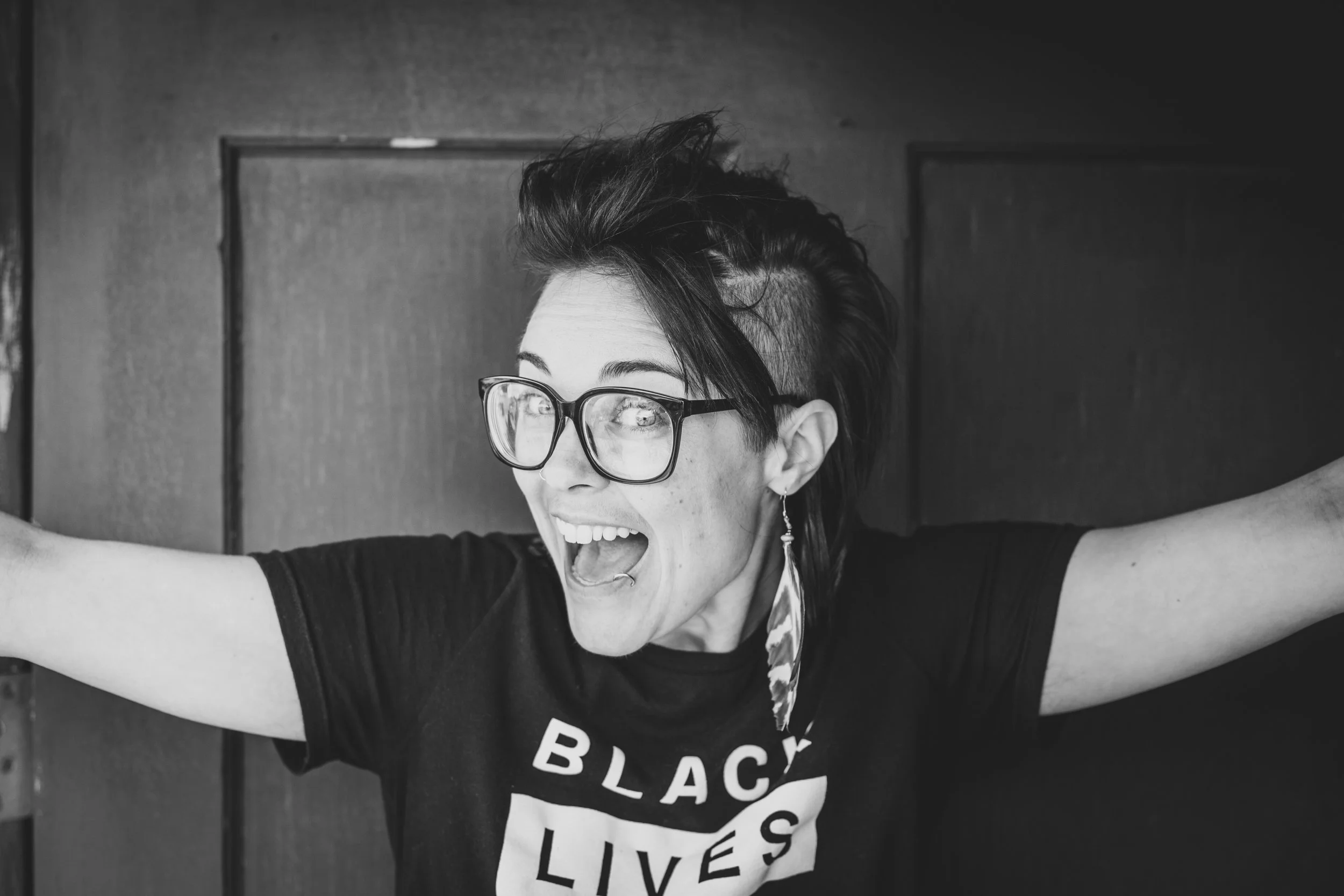Paris Hurley : Interview 26
Paris and I met when she bought a guitar pedal off me via Craigslist of all places. Craigslist is generally pretty hit or miss, to put it mildly, so I totally lucked out that she was wicked cool and had time for Five Questions.
Paris is a violinist, composer, contemporary dance artist, choreographer, and feminist.
Meet Paris.
What’s your greatest accomplishment?
I’d have to say bringing a conversation about feminism to areas of the Balkans that—I traveled with this group Kultur Shock, which is like punk/metal/gypsy/folk/rock music, mostly throughout the Balkans for like eight years and I was met with a lot of really intense sexism and misogyny.
And being a woman in the rock world who’s not the “girlfriend,” not just the vocalist—not that I have anything against vocalists because I’m also a vocalist, and who is a serious musician.
A lot of women reflected back to me, “I didn’t even know what feminism was. And so I’ve looked it up and I’m a feminist now!” Or “I’ve done all this research!” or “Have you seen The Punk Singer with Kathleen Hanna?”
This whole world of feminism that exists and has existed for a lot of years and is in this new wave of people taking it on and owning it in their own ways and in more intersectional ways.
But yeah, the work that I manage to do with individuals in those communities—women and men, honestly, who reflected that they had a different understanding of what that is and their own relationship to it.
What's one thing you don't know now, but feel compelled to know BEFORE YOU DIE?
I’m trying to decide which scale I want to answer in, ya know? [Laughter]
Right now I am in an educating-myself-through-books phase in this way that I’ve never really done before. There was the required high school reading a long time ago, then the occasional, “Oh I love that Patti Smith book ‘Just Kids’” or Murakami or something. But I’ve just not really been making time for reading. And with such a strong relationship to feminism for a lot of years and not knowing a lot of history of that and definitely having a limited view of what that is, that’s one topic I've been into.
Right now I’m reading feminist sci-fi by Octavia Butler which is totally not a genre that I had any interest in, but I realize that dystopian, feminist, sci-fi version is kind of my jam! That feels like the current, “I want to spend some time with this and catch up on it because I feel like I haven’t given myself or shown up for it.”
How do you define failure?
Not trying. And it’s a challenge! [Laughter] It’s so easy to create all these excuses and not try and think, “Failure is something else. Failure is when you do it wrong or you don’t get some form of external return or success.”
But yeah, it’s not trying. That’s my simple answer.
How do you define being “in love”?
Something that I want to show up for and that I get excited about, that I have a fervor for. Something that has room for change in the whole of me. So whether it’s a person, a project, an idea, or a place, an experience…something where I feel very alive and I don’t have to shut down or compartmentalize or quiet some part of myself to exist there.
“Something that I want to show up for and that I get excited about, that I have a fervor for. Something that has room for change in the whole of me. So whether it’s a person, a project, an idea, or a place, an experience…something where I feel very alive and I don’t have to shut down or compartmentalize or quiet some part of myself to exist there.”
The change factor is big for me especially if it’s a person. Anything that feels very contained or stagnant or it can only be one or five things…it might be real in a moment, but it doesn’t feel sustainable.
STEVE: I appreciate that concept of change in a relationship. It’s something I want to build into whatever relationships I have. There has to be room for change I think.
PARIS: Yeah, to me it’s not forever or “I’m just swept away.” I mean, there’s an aspect of that…
STEVE: I think there is, but speaking for myself, I don’t want to be lost in love, I want to be found in it. I don’t want to fall in love, I want to rise in it. I want to grow.
What will you miss the most when you’re gone?
Like dead gone? Or like when I leave this room? [Laughter] That’s such a strange one! Because it brings up so many layers of what happens when we die.
I’m going to answer it in an annoying way, which is I don’t want to believe that’s how I have to think about now and death. My hope and my goal is that I’m living now so that I feel good about that.
And not in the the popular YOLO, do fucked up shit and have no accountability, but I want to show up so that I feel really great about now and then whatever is after I’m gone is then the now.
I really love nature. That feels very real to me especially being in L.A. Coming from Tucson and Seattle that are very—you can get out in it really easily. Here it’s a pretty different culture, at least on the surface, and I’m realizing a different importance for me to get out into it at least once a week because that feels real.
If in some way that realness doesn’t continue, if you just don’t have consciousness and that’s that—well, I guess if I don’t have consciousness, I won’t miss anything—but if I do, and nature’s not an option, I’d really, really miss that.
Final Note ~
While I researched Paris and her work, I came across her Support the Work page on her website where she dives into the What, the How, and the Why of her approach to the sustainability of working artists. I highly recommend reading this page and considering whether your next $15 is worth spending on a local theater, art, or music performance. (My bet is that it is.)

